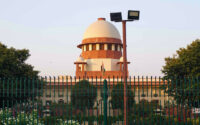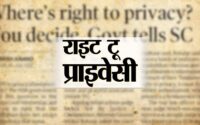Threat to human rights, bodily integrity highest in thanas: CJI Ramana
This article is written by S. Karpagam
Introduction:
India’s Chief Justice NV Ramana noted that to find the beliefs and religions of the people, the judiciary must make everyone, and the majority of vulnerable citizens living outside the justice system, feel confident that it was there for all. Introducing the latest software developed by the National Legal Services Authority (NALSA) which aims to provide assistance to the poor through free legal aid, Justice Ramana said, “For the longest time, weak people live without a justice system ”. “Threats to human rights and physical integrity are the highest in police stations,” he said in a statement issued by the National Legal Services Authority of India (NALSA). Police harassment and other police violence are still widespread problems in our society. According to information shared by the Minister of Home Affairs Nityanand Rai in Parliament last week, the official number of culprits arrested between 2017 and 2019 was 1,189 and among them 348 were killed by police. Many experts believe that this child abuse data is uncountable. According to the National Human Rights Commission (NHRC), 1,723 people have died in detention and in police custody throughout India in 2019 alone. “This includes 1606 deaths in custody and 117 deaths in police custody, which means an average of five deaths every day,” said the National Campaign Against Torture.
Legal representation:
Lack of legal representation at police stations is a serious threat to detention or detention. The first hours of detention or detention often determine what the case will be about the defendant, the CJI said. The chief justice was speaking during the release of the National Legal Services Authority application and opinion statements in Vigyan Bhawan.
The CJI had a voice of advice for fellow judges.
Chief Justice Ramana noted that if the judiciary wants to win the trust of the poor and vulnerable, it must ensure that those who are looked down upon are there for them. “If the judiciary wants to strengthen the faith of our citizens, we must make everyone feel confident that we are fighting for it. For too long, vulnerable people live outside the justice system, ” said the CJI. The long, expensive legal procedures followed by the courts prevent the poor and vulnerable. The biggest challenge for justice today is to overcome these obstacles, he said. “If we want to live as a law-abiding society, it is important that we close the gap in access to justice between the privileged and the most vulnerable. At all times in the future, we must remember that the realities of social and economic diversity that exist in our nation cannot be the cause of the denial of rights. The past should not determine our future … ”
Digital divide:
Chief Justice Ramana said the digital divide did not help the cause of easy access to justice. Rural and remote areas suffer from a lack of connectivity. “Getting justice in India is not just a matter of aspirations. We must work with the various spheres of government to make it a reality. ” The Chief Justice said he had written to the government about the urgent need to close the digital channel “seriously”. “Let us dream of a future based on the rule of law, a future in which equality is a reality. That is why the ‘Access to Justice’ project is a never-ending process, ”said CJI Ramana.
Emphasizing the importance of legal aid that reaches the most disadvantaged in remote areas, the CJI said, “If we want to live as a law-abiding society, it is important for us to close the gap between access to justice and the most vulnerable and vulnerable. At all times in the future, we must remember that the realities of social and economic diversity that exist in our nation, cannot be the cause of the denial of rights “.
Speaking at the event, NALSA executive committee chairman Justice UU Lalit said the council plans to actively use the Indian Postal Service’s extensive network to spread awareness about free legal aid to the poorest. He also said that to make the ‘justice for all’ campaign a success, NALSA is negotiating with law colleges and universities to force third- and fourth-year law students to register as legal volunteers to help those in need of legal aid at no cost from national and government legal aid services.
CJI Ramana said that almost 75 years after the country gained independence, harassment and other police brutality still exist in our country. “Threats to human rights and physical integrity are the highest in police stations. Harassment and other police brutality are widespread problems in our society.” The CJI has appealed to all attorneys, especially senior lawmakers, to provide “a certain percentage of their working hours” to assist those in need of legal aid.
Calling NALSA’s project “Access to Justice” a never-ending goal, the CJI said its biggest obstacles were long, costly and costly processes. As an institution, the biggest challenge before us is to overcome these barriers first … The problem of poor communication in rural and remote areas that adversely affects the delivery of justice was highlighted by all (senior HC judges working with them after taking office. Such as CJI). Most importantly, he said that I have already written to the government emphasizing the need to close the digital divide in importance.
Conclusion:
Apart from the promulgation and confirmation of the constitution (of rights), the absence of effective lawyers at police stations is a serious risk to incarcerated people. The decisions taken in the latter case will determine the defendant’s ability to defend himself. According to the latest reports even those with the right to third-party medical care, “he said, also suggested that NALSA should work hard to promote national security. He said that although the legal profession, which started 25 years ago, had gained new momentum, it still had to reach a large segment of the population. Ours is one of the largest legal aid programs in the world. However, it is an undeniable fact that there are significant barriers to accessing relevant legal information.
Citations:
- [scroll staff], [Threat to human rights is highest in police stations: Chief Justice of India NV Ramana], [scroll], [2021]
- [wire] [CJI N.V. Ramana: ‘Threat to Human Rights, Bodily Integrity Highest in Police Stations’], [wire], [2021]
- [Dhananjya Mahapatra], [Threat to human rights, bodily integrity highest in thanas: CJI Ramana], [Times of India], [2021]


